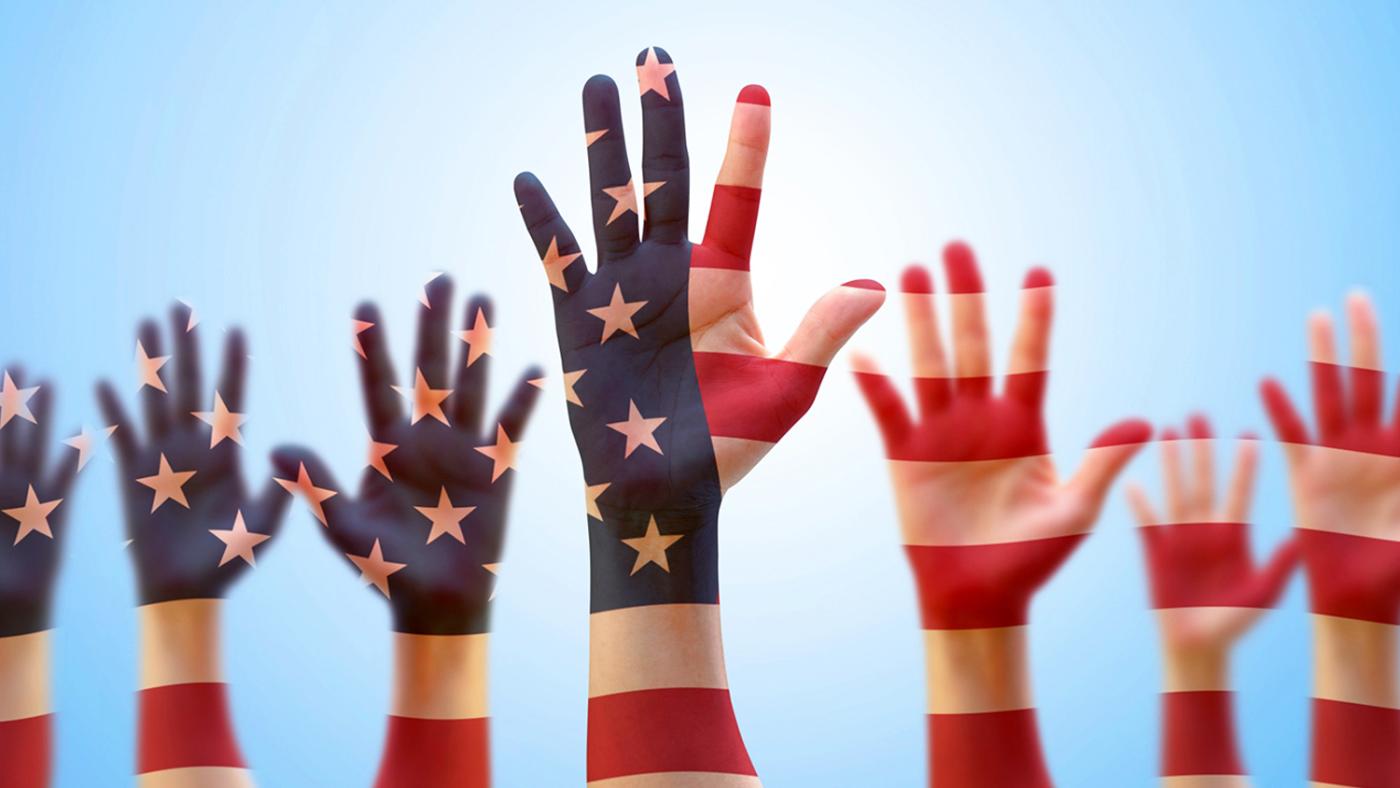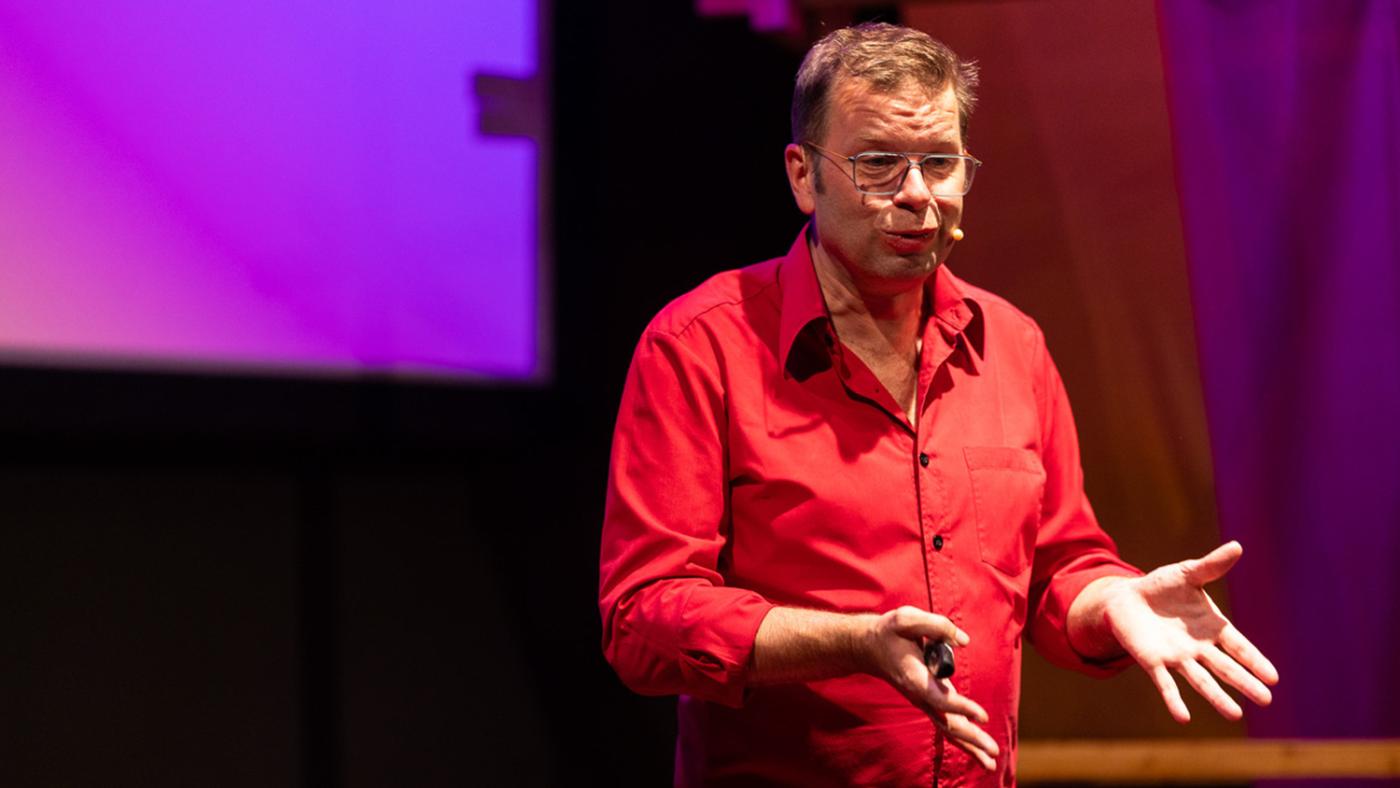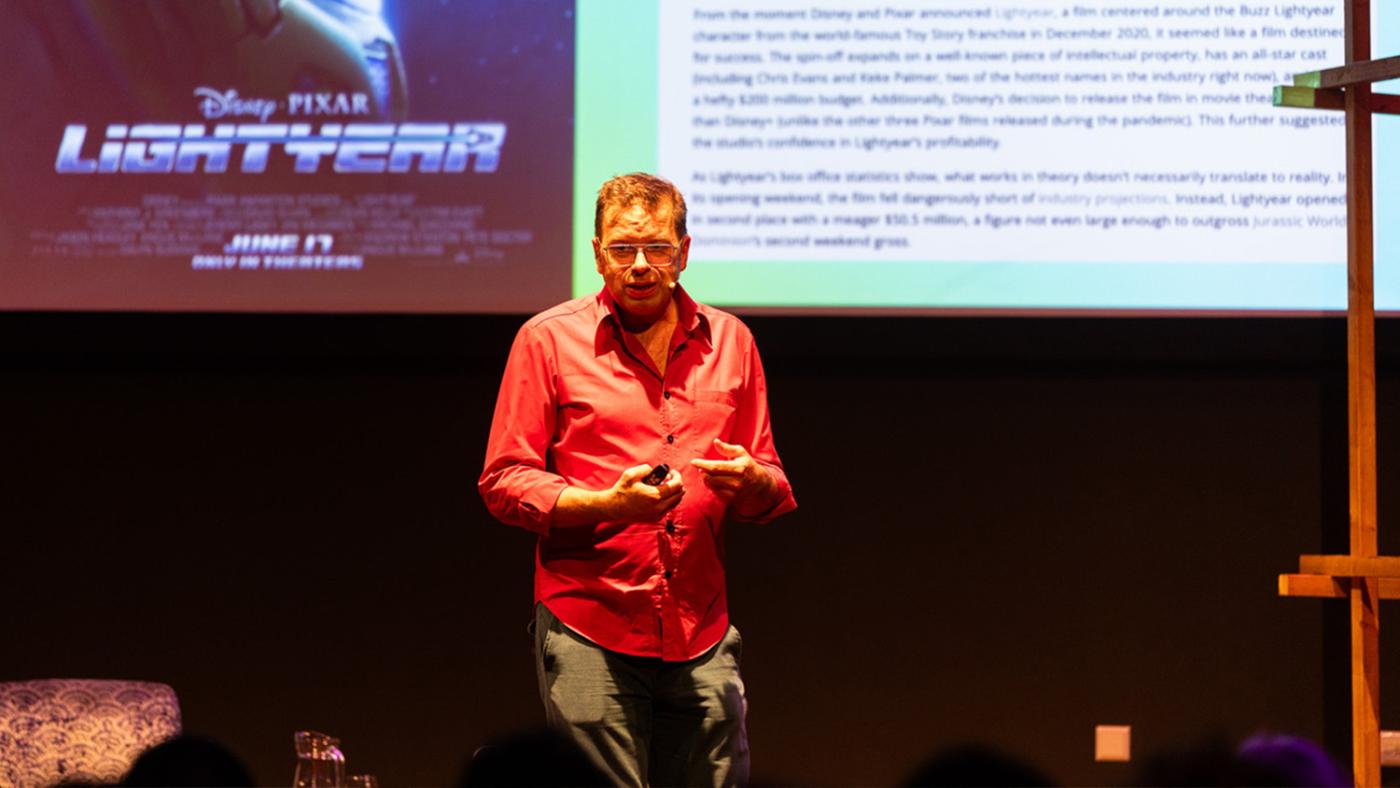Media researcher Dan Hassler-Forest:
‘American presidential elections are the political equivalent of a boxing match’

Although the neck-and-neck presidential race in the US can sometimes be anxiety-inducing, many students are still willing to pull an all-nighter to learn more about the political context in the country and be among the first to hear the results. Studium Generale and the national newspaper NRC have joined forces to organise a whole night of lectures, performances and live TV broadcasting at TivoliVredenburg, on November 5, election day in the US.
UU Media scholar Dan Hassler-Forest, originally from New York, is one of the lecturers in the programme.
What can people expect from your lecture at TivoliVredenburg?
“I will talk about how American presidential elections aren't just elections, but also a media event that lasts a little bit more than a year. They're unlike most European elections because of the two-party system, with two people representing different political perspectives. That is staged in the media as an ongoing dual. The media continuously offers revelations and new changes in polls, thus building an exciting narrative for people to follow. This is not unique to American elections, of course, but because it’s so focused on two individuals, it is the political equivalent of a boxing match.
I’ll also talk about how this process has changed in the 21st century as the media landscape has been transformed by social networking platforms. A substantial number of people no longer feel that they can trust any traditional media institutions.”
This distrust of traditional media outlets is something Trump’s campaign explores often.
“There is a general perception that traditional mass media has absorbed the progressive changes that have reshaped patriarchal capitalism after the 1960s. Sexism, racism and homophobia aren't acceptable within a public forum, so politicians, especially those on the far right, have benefitted or presented themselves as benefitting from social networks to bypass their dependence on traditional media outlets.
Journalism used to have the function of criticising politicians and holding them accountable, but politicians also needed journalists to reach a mass audience. In the past 15 years, many politicians have claimed they no longer need mass media because they can now reach voters directly. This is only partially true, as social networks are not always a reliable way of reaching a broad audience. The dynamic we’ve seen emerge is that politicians say outrageous things on social media, and those are reproduced and amplified by traditional media.
Traditional media feels threatened by social networks to some extent. They feel forced to amplify what happens on social media and simplify their discourse to be able to compete. In so doing, they make their operations as watchdogs less impactful.”

Dan Hassler-Forest. Photo: Juri Hiensch
Both campaigns reflect this weakened position of traditional media. Kamala Harris has given few unscripted interviews. Trump does it more often, but he tends to choose outlets that are already favourable to him.
“This is one of the main problems facing not only the US but many democratic nations. There are no longer any media channels that can reliably present themselves as being representative of a majority or mainstream or the centre. They have all been forced to become niche-oriented. This is evidenced by the number of people saying they no longer trust what the media say at all. They believe all commercial media and state-funded media are inherently corrupt and unreliable.
It's been interesting to teach critical media literacy in this day and age. I used to try to teach students to be more critical of media, and now I’m trying to teach them to be critical in a responsible way.
I often tell students that media used to be a full meal with vegetables, carbs and protein. To be a healthy citizen, you had to consume news that was created by institutions that may not have been perfect, but they were at least accountable and had processes for maintaining responsibility. Today, we live in a media landscape where we think everything should be dessert all the time, and news organisations are trying to turn broccoli into cake. Journalism must be more emotional and entertaining to compete with all the content out there. It has to be fast, emotional, fun, light, and accessible. Otherwise, it’ll be ignored. Meanwhile, political journalism and investigative journalism require nuance, research, and larger budgets.
Moreover, algorithms largely define what we get to consume, and they give us more of the things we like. Then you get the problem of confirmation bias: rather than being forced to face facts or opinions we don’t agree with, we are reassured that the things we believe are actually true.”
No matter who wins these elections, none of this is going away. The USA is divided and social media will continue to fuel polarisation. Is there a way out?
“The only way out I see would require a massive political shift, and that requires public support, which isn't there. So, my proposal is not a realistic one, but I think we should severely regulate and democratically supervise commercial media networks – that includes companies like Amazon and Apple, which have gained far too strong a hold on the political process.
Elon Musk recently appeared at a Trump rally in New York. Jeffrey Bezos reportedly told Washington Post editors (the newspaper is owned by Amazon since 2013, Ed.) not to endorse Harris but rather have no endorsement for the first time in over a century. Nobody elected these people, yet they directly impact the way politics are represented in media platforms.”
It’s interesting to observe how the two candidates try to reach young voters on social media. Harris referenced Charli XCX’s album Brat, for example. Do such strategies work?
“That's a very tricky needle to thread because the Democratic Party is far removed from many of the ideas held by Generation Z. The vast majority of young voters consider an immediate ceasefire in Gaza a top priority, while Democrats show a lack of resolution in even addressing that. Harris tries to align her image to the identity politics of the progressive left, but that’s playing with fire because it's easy for people to get disappointed later.
Meanwhile, it’s a lot easier for Trump (and the far right in general) to get involved with meming and trolling culture, which is more about taking the piss. You do things that aren’t considered acceptable and that appeals to people precisely because they’re not considered acceptable. In so doing, they give people the feeling that they're sticking it to some kind of elite that is ruling them.
So, it looks like meme culture has been more conducive to populist far-right positions than to the positions of the Democratic party, which, for many reasons, feels that it can’t push very far to the left. Instead, to win the elections, they must court conservative voters.”
No presidential candidate has ever entered the race as late as Kamala Harris. Do you think this works in her advantage or is it more of a disadvantage, as it also means less exposure?
“With this particular opponent, in this particular moment in history, I think it’s worked in her advantage. The Democratic Party was seen as stale and both parties were seen as old men's parties. The dominant narrative was that whoever you voted for, you’d get a senile old guy.
So, having someone who is younger and ready to step right up and play ball, someone who immediately got the support of her entire party… I think it’s worked in her advantage. There is also the symbolic importance of a woman of colour maybe becoming the next president.
The main disadvantage is that the other side can argue: ‘We don’t even know who she is!’. It makes it very difficult to see her as anything but the less bad alternative to a truly bad candidate.”
Both Republicans and Democrats seem to want a breath of fresh air.
“Yes, many voters in the US desire somebody who feels fresh, real and authentic – like Alexandria Ocasio-Cortez when she first arrived on the political scene. She represented the ideal of true working class, who didn’t speak jargon and wasn’t fully controlled by institutional party politics. However, as her career developed, many people have become disappointed, saying she’s now part of the Democratic institution.
But I think this is another symptom of living in an algorithmic culture where everybody comments everything all the time: it’s too easy to be critical of almost anything a person does. It’s also a symptom of the filter bubbles I mentioned earlier: most politicians don’t exactly match what we would like them to be, and some of us become enraged as soon as there is that kind of disappointment. This symptom tends to be stronger on the left. If you say the wrong word or if you posted something bad three years ago, there is less goodwill. That makes it more difficult to organise a broad coalition.”

Dan Hassler-Forest. Photo by Juri Hiensch
What do you expect from a second Trump term?
“Oh, good heavens! I hate to say it, but it’s probably not going to be as bad as I imagine it will be. It’s not like Darth Vader winning at the end. It would make existing problems substantially worse, whereas a Harris administration would make them only somewhat worse. Many policies from the Trump administration, including those on deportation and border patrol, were continued by the Biden administration, but people didn’t take notice of it, like they didn’t take much notice of the number of drone strikes under the Obama administration.
So, I don’t think it will matter as much as I fear it will. That’s what I hope. But then again, it could be apocalyptic [laughs]. I’m laughing because I don’t want to cry. A lot of people talk about Trump as if he were just a normal candidate, but he isn’t. How can you even speculate what a narcissistic billionaire with no political aspirations (other than staying out of jail and increasing his wealth and influence) is going to do?
What I’m most concerned about is the public sphere. Since the first Trump administration, some people have felt licensed to engage in racist and sexist abuse, which was also internalised by judges, police officers etc.”
What do you expect from a Harris administration?
“I think she will operate along the lines expected of an established Democrat. It would follow the neoliberal, slightly centre-left-leaning line of Obama and Biden. I also expect government support for things that are often considered personal lifestyle choices, like birth control and abortion rights. The most you can hope for is unionisation. But, you know, both candidates are determined capitalists, so in the end, it doesn’t matter that much. It’s like, how bad do you want your capitalism to be?”
Following the US elections in Utrecht
This is the second time TivoliVredenburg hosts an Election Night, but it is the first time Studium Generale and NRC are also involved. All lectures are in Dutch. Aside from Dan Hassler-Forest, the programme includes lectures by UU researchers John Kennedy, Kim Dankoor, and Rutger van der Hoeven. But it’s not all going to be heavy and serious: DJ sets, country music and a lecture on Taylor Swift are also on the menu.
All 1,250 tickets have been sold, so if you want to go, Ticketswap is your last hope. “There is a clear audience for this and many of the attendees are young people and students,” says Erwin Maas, from Studium Generale.
Suppose you don’t score tickets to Tivoli. In that case, you can go to Boom Chicago, in Amsterdam, and join the watch party organised by Democrats Abroad, the official arm of the Democratic Party in the Netherlands. It will include a show by comedians Pep Rosenfeld, from Saturday Night Live, and Greg Shapiro, also known as Trump’s voice in the viral video The Netherlands Second by the TV show Zondag met Lubach. There will also be a second chance to watch Shapiro’s show, Leaving Trumpland 2.0, right here in Utrecht, at Stadsschouwburg, on November 15.
Last but not least, you can watch the biopic The Apprentice, about Donald Trump’s youth, at Louis Hartlooper Complex.